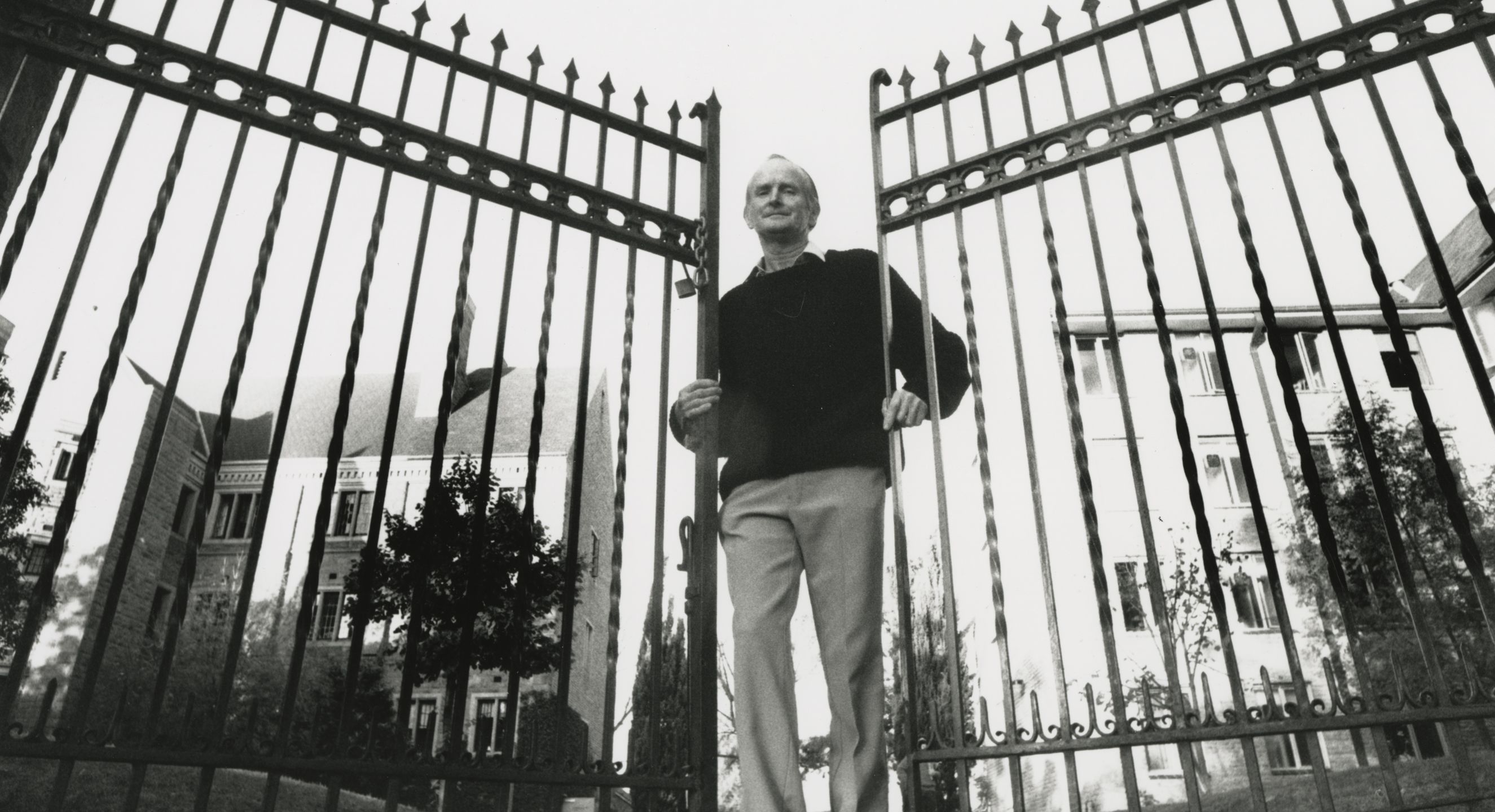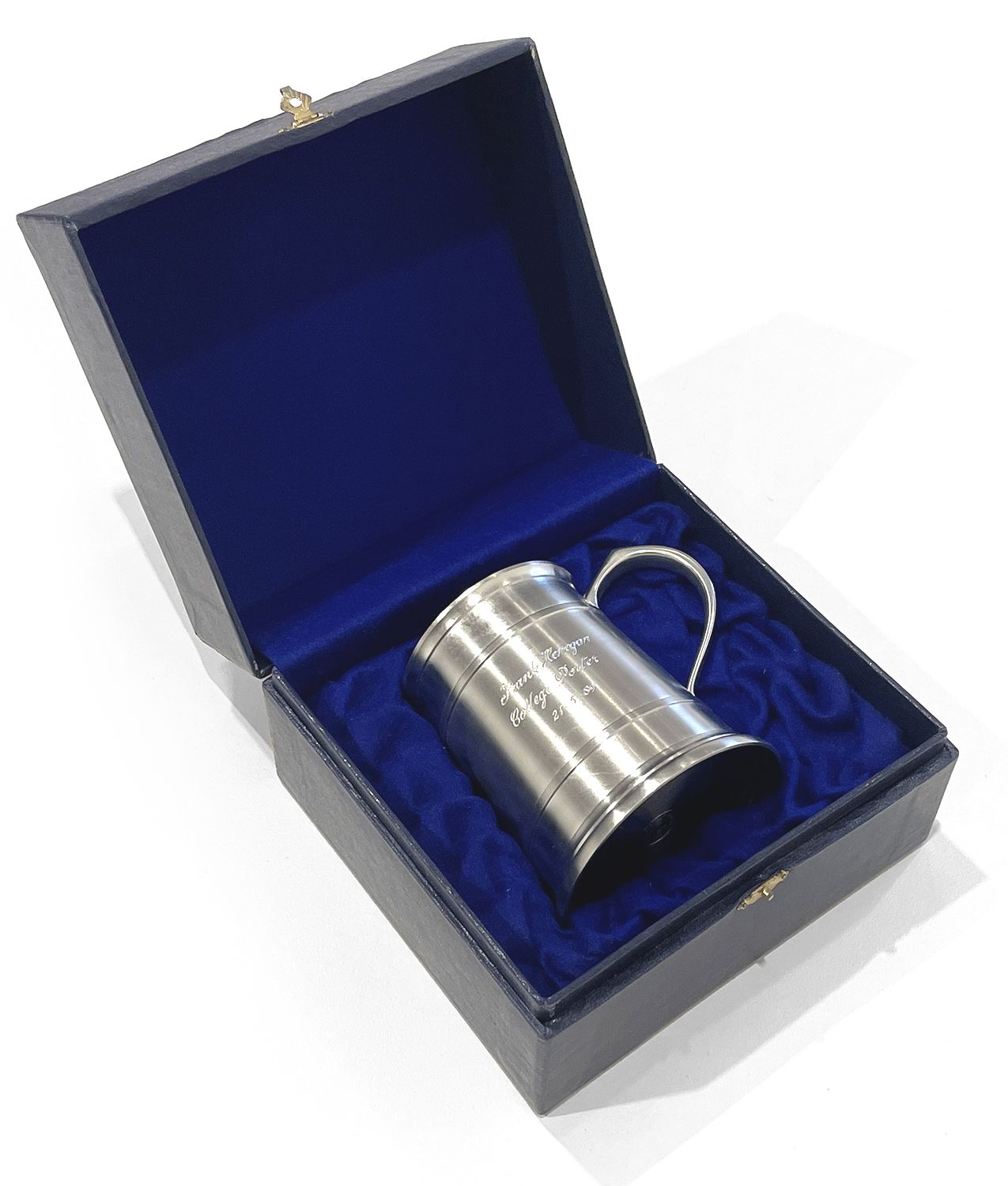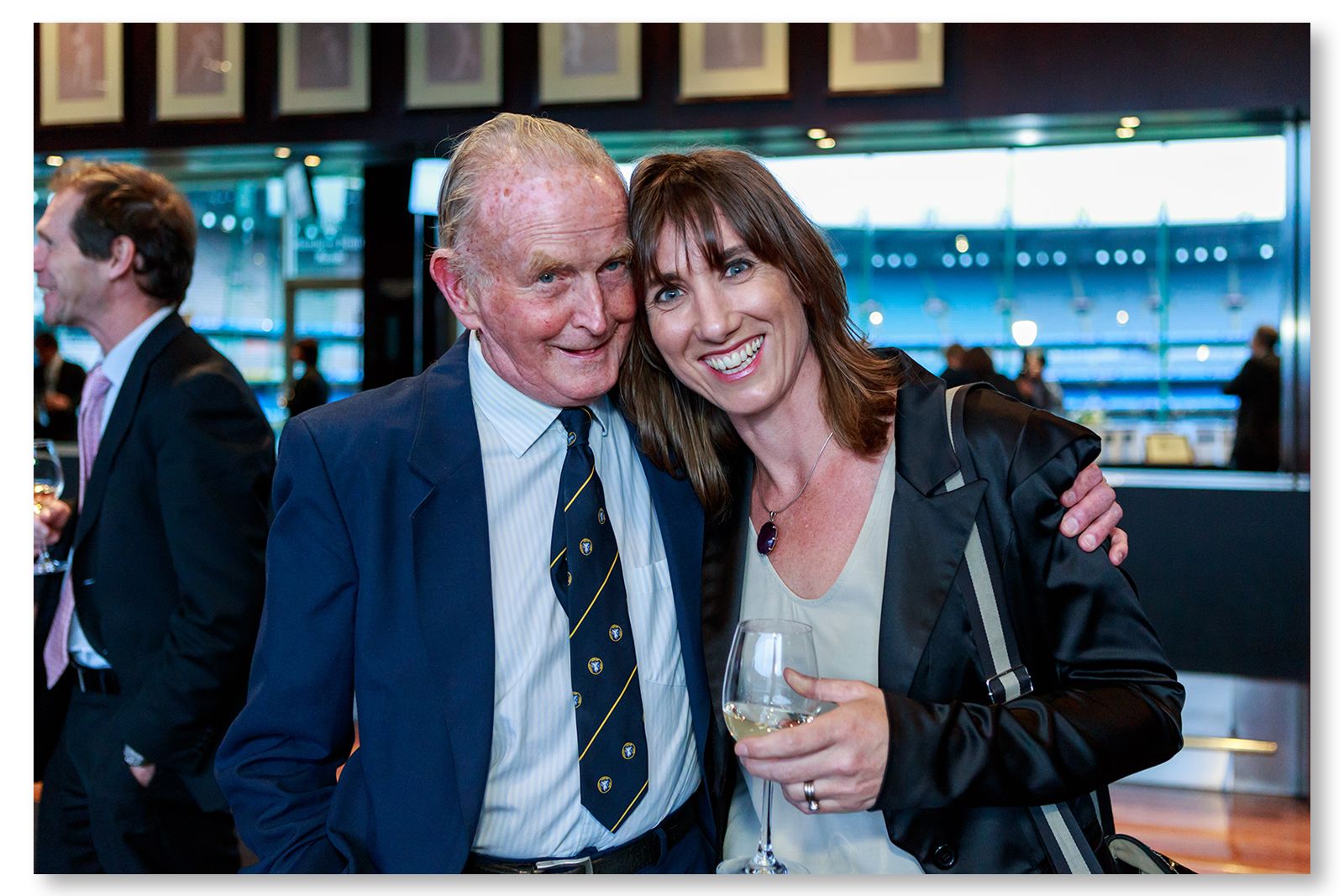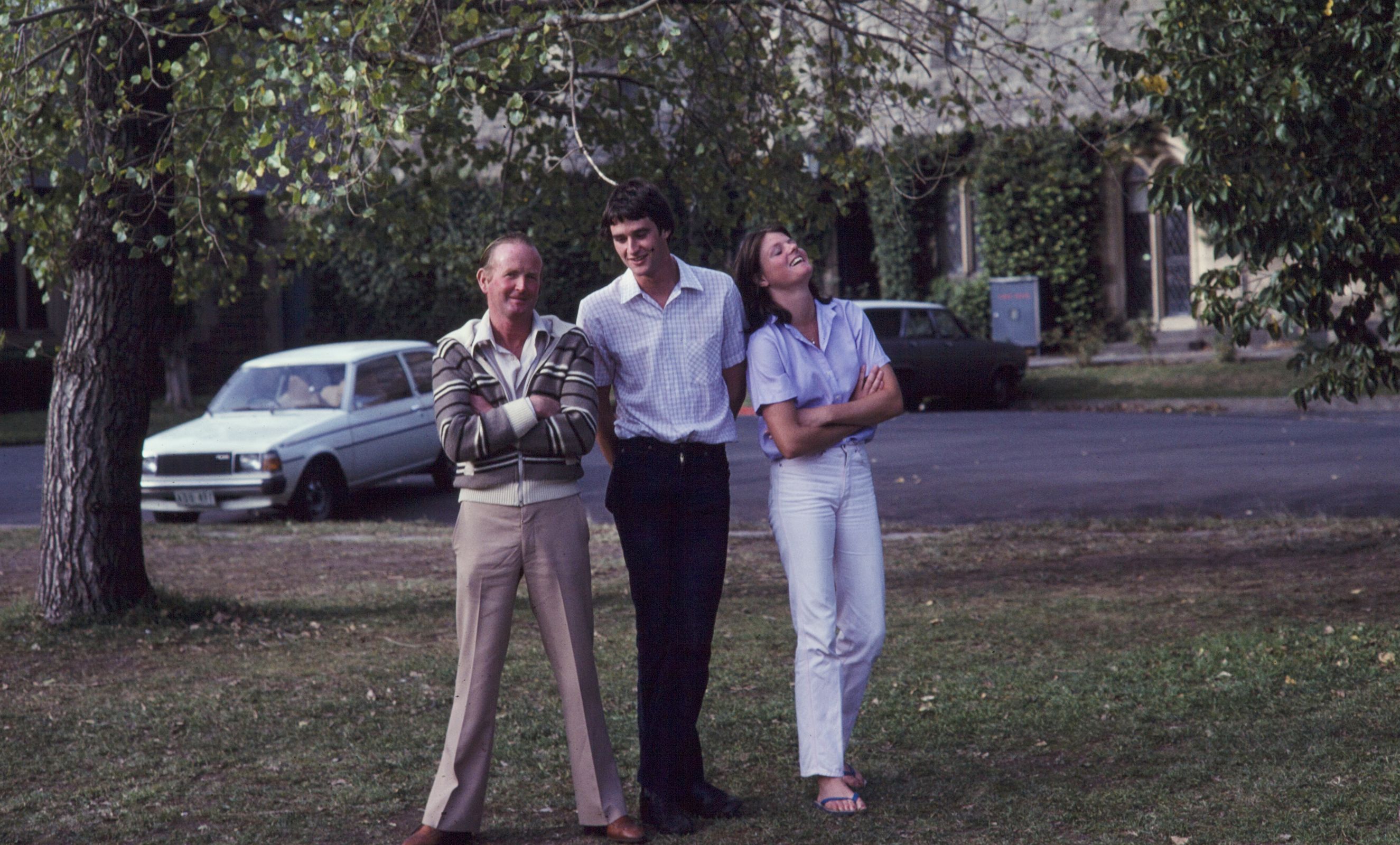To be perfectly Frank
Remembering
Frank Henagan

'For him it was an honour to serve; however in his quiet way, Frank knew that he had something we all needed even if we didn’t appreciate it ourselves at the time.'
It's been almost a decade since Trinity College lost Frank Henagan, a figure that looms so large and is so deeply entwined with the experiences of decades' worth of alumni that it can still surprise some when mention of his name is met with blank expressions by current students with the quizzical reply, 'Who's Frank?'
So ... who is Frank?
In many ways, it's a good question. Frank Patrick Henagan was born in Adelaide on 28 November 1933. 'Exactly where he was born is lost in the sands of time', his later biographer Dawn Leicester (TC 1979) mused, 'but what is known is that he lived in an orphanage until 1938.'
In that year, he was adopted by an elderly couple, the Henagans, and moved to Melbourne to grow up in a home in Albion Street, Brunswick East.
His adopted father Frank Henagan Senior had worked in quarries as a 'powder monkey', setting the explosive charges for blasting; until something went wrong and one detonated prematurely. It left Frank Senior blind and for the remainder of his life he made his living busking in Bourke Street Mall and selling matches. He died in 1942, and his wife Maud followed three years later.
The couples' adult daughter Myrtle – Frank's adopted sister, then in her early 30s – continued to raise him.
As he grew into his teens, Frank said he 'kind of worked a few things out myself', coming to the realisation that his 'sister' was in fact his mother; that the couple he'd known as his parents were actually his grandparents.
Devout Irish Catholics, the Henagans had managed to shield their daughter from social disgrace for having an illegitimate child, all the while providing a loving home for her son and their grandchild.
Frank attended Moreland Primary School in Coburg before going to Parade College in East Melbourne to complete his matriculation. He was then accepted into RMIT to study engineering.
It was a great opportunity, but not where Frank's heart lay.
A gifted middle-distance runner and footballer, Frank's held ambitions of becoming a physical education teacher but he was dissuaded by his teachers who were concerned about his speech impediment. It would be a lasting regret for Frank, eased in some measure by his later involvement with sports at Trinity.
Frank completed two years at RMIT, working at night at Radio Corporation to help support himself. He was actively involved in athletics and competed in country gift meetings throughout the state. It was a busy schedule and Frank would later attribute subsequent events to him doing too much.
Perhaps it was compounded with the revelation of his parents, but the weight of things all became too much for him to carry and he suffered a nervous breakdown.
To aid his recovery, the advice was to get away from Melbourne, to find new outlooks and horizons.
In the early 1950s, Frank moved to Mildura with his girlfriend Margaret and picked up whatever work came his way. In the sun-basked corner of northern-western Victoria, there was always fruit to pick and football to be played with the Mildura Imperials Football Club.
Even in Mildura, hardship followed Frank however. Margaret developed leukemia, for which there was limited treatment in the 1950s. The couple returned to Melbourne where she succumbed to the disease.
The rural experience of Mildura no doubt helped Frank decide that an outdoor life was the best fit for him. After qualifying with the Royal Victorian Bowls Association as a green keeper in the 1960s, Frank worked for periods at the Kew and Fitzroy Bowling clubs before joining the staff of Port Melbourne Council around 1966. His time at Port Melbourne straddled attending to the city's gardens alongside a role as trainer for the Port Melbourne Football Club.
A young Frank Henagan (left) umpiring for the University football team in the 1950s. President of the University Football team, and college Warden, Ron Cowan is seated in the front row.
Trinity College Archives, MM 001172
Frank Henagan (standing, right) with the University football team heading to Adelaide in the 1950s.
Trinity College Archives, MM 008004
Frank Henagan with Warden Evan Burge on the Bulpadock, c. 1980s
Trinity College Archives, MM 005903

Frank's presentation pewter, given to him upon being appointed College Porter in May 1989.
Frank's presentation pewter, given to him upon being appointed College Porter in May 1989.
Work for Port Melbourne required residency in the borough and Frank lodged at a boarding house while travelling across the city multiple times a week to the University where he was involved with the Uni Blues.
Between 1956 and1963, Frank ran the boundary line for the Blues in the Amateurs and for the following decade from 1964 was boundary umpire for the then VFL League Seconds. Through these connections, umpiring and later training with the Blues, Frank was introduced to Trinity students Justin Cook and Rod Lyle in 1976. The pair encouraged him to apply for the role of gardener at the college. He commenced that year.
It was not a task for the faint-hearted. Having already inspected the college gardens before his first meeting with the then college bursar, Alan Todd, Frank was more than a little taken aback when Todd offered him the role on the spot.
He had noted the unkempt rose bushes that hadn't been pruned in years, and lawns and weeds that had been left to their own devices. It would take time, patience and attentive care to bring the grounds back in to line and Frank set about doing exactly that.
Across the following almost 40-year association with Trinity, Frank served under three Wardens, and numerous Deans and other staff. He held a number of official roles, from grounds keeper, Chapel verger, college porter, and undertook no end of other roles that he realised needed doing. Taffy Jones (TC 1957), a long-time friend mused:
'How anyone could have written a formal "job description" for what Frank just "did" around the College defies belief'.
If Frank was known for any one role, however, it was his involvement coaching college sports, something which commenced almost as soon as he started in the mid-1970s.
His coaching soon began to extend beyond his beloved football, and in time the role of Director of Sports was created at Trinity to accommodate the evolving breadth of his work in this area. With Trinity having moved to co-residency in 1974, women's sports soon became a regular feature of the sporting calendar.
Frank, who had been heavily involved with college athletics due to his own running background, soon began to branch out into coaching of the emerging women's football and netball teams. And his assistance would often prove invaluable, in all sorts of situations.
When Vivienne Corcoran (TC 1979), then cox of men's Second VIII, was facing some challenges getting the crew out of bed for morning and take their training seriously, Frank stepped in. Needless to say, the crew were soon rising early and on the water. They went on to win the rowing regatta that year.
Frank Henagan on the field advising the 1994 Premiership football team
Trinity College Archives, MM 008089
Frank Henagan celebrating with the victorious 1994 Premiership football team in the Dining Hall.
Trinity College Archives, MM 008084
Football, being his passion, became Frank's first attention. Trinity hadn't won a match in two years and it would still be a further three years before they did. Indeed, successes would remain limited. Despite some strong teams throughout the 1980s the illusive grand prize was always seemingly just out of reach.
That changed heading in to the 1990s, when Trinity made the grand final for four consecutive years and winning the premiership in 1994 with a team that would include alumnus, and later CEO of the AFL, Gil McLachlan. But even Gil was forced to admit at Frank's 80th birthday in late 2013, a single premiership across 30 years was not the best of coaching records.

Frank with Sally Gorton (TC 1989) at his 80th Birthday held at the MCC Long Room in November 2013.
Frank with Sally Gorton (TC 1989) at his 80th Birthday held at the MCC Long Room in November 2013.
But in many ways, more than his presence on the sporting field, it was Frank's friendship with students and staff alike that endeared him to generations of Trinity.
All three Wardens sought out and valued his wise counsel and many a student valued his worldly advice, or a lunch across the road at Cafe Royale.
'Frank had a wonderful way of increasing my confidence when I doubted myself,' later Senior Student Pip Duffy (TC 2004) recalls, 'and yet quietly letting me know when an alternative path or decision was necessary.'
Frank was a quiet achiever who never sought the limelight but simply got on with doing those things that he saw needed doing. Well in to his senior years, he would be seen moving furniture around the college for events 'and a thousand other thankless odd jobs', Chris Watkins (TC 1997) remembers.
'He straightened us up a bit too and made you feel like you belonged.'
Senior Student Michael Traill (TC 1979) described Frank in this way:
'In truth I know I will share with very, very many a sense of closeness to Frank because he had in such radiant abundance the twin qualities of authenticity and perceptive interest in who you were. Add to that a platinum-grade B.S. detector, and you have a man whose influence and presence will live with all who knew him.'
Having lived within the residential student community for years in lower Bishops', shortly after turning 80, Frank's health took a turn, and he was admitted to hospital over the 2013 summer break. He passed away on 6 January 2014.
The day after his funeral, staff came into college and were surprised to find the furniture not set for formal Hall; it was one of the tasks that Frank had simply set about quietly doing that had gone largely accepted for years.
As Taffy Jones (TC 1957), remembered him in the weeks after his passing:
'Frank turned 80 in November last year, a few weeks after a gala celebration of his milestone at the MCG. He has been one of the great figures of College life for close to 40 years, and it is very hard to imagine Trinity without him.'
Frank with John Williams (TC 1977) and Xenia Boynton (TC 1979) in front of the Leeper building. Trinity College Archives, MM 0005895


Dr Ben Thomas, Rusden Curator, Cultural Collections
Dr Ben Thomas, Rusden Curator, Cultural Collections





